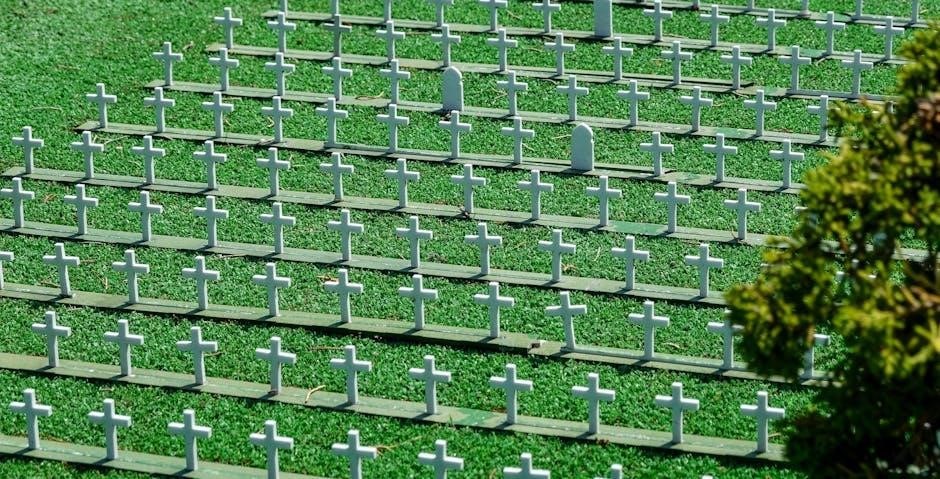
order of christian funerals pdf
The Order of Christian Funerals (OCF) is a comprehensive guide outlining the rites and prayers for Catholic funeral liturgies, emphasizing consolation, hope, and intercession for the deceased․
1․1 Overview of the Order of Christian Funerals (OCF)
The Order of Christian Funerals (OCF) is a liturgical guide that provides the structure and prayers for funeral rites in the Catholic Church․ It emphasizes the Church’s belief in the resurrection and eternal life, offering consolation to the bereaved while interceding for the deceased․ The OCF includes three main rites: the Vigil for the Deceased, the Funeral Mass, and the Rite of Committal․ These rites are designed to honor the dignity of the human body, reflect hope in the resurrection, and provide spiritual support to the mourners․ The OCF also highlights the importance of prayer, liturgical music, and communal participation, ensuring a meaningful and sacred celebration of life․ Its structure and teachings are accessible in a downloadable PDF format for reference and guidance․
1․2 Historical Background and Development
The Order of Christian Funerals (OCF) traces its roots to ancient Christian burial practices, evolving over centuries to reflect theological and liturgical developments․ The modern OCF, revised in 1989, is part of the liturgical reforms following Vatican II, which emphasized active participation and clarity in ritual․ It replaces earlier funeral rites, integrating them into a cohesive structure that balances mourning with hope in resurrection․ The OCF reflects the Church’s teachings on the dignity of the human body and the importance of communal prayer․ Its development underscores the Church’s adaptability to cultural and pastoral needs while maintaining sacred traditions․ Available as a PDF, the OCF serves as a practical guide for clergy and laity, ensuring the funeral rites remain meaningful and faithful to Catholic doctrine․
Liturgical Structure of the Funeral Rites
The funeral rites include the funeral Mass and a vigil, which are most properly celebrated in the parish church of the deceased, offering worship, consolation, and hope in resurrection․
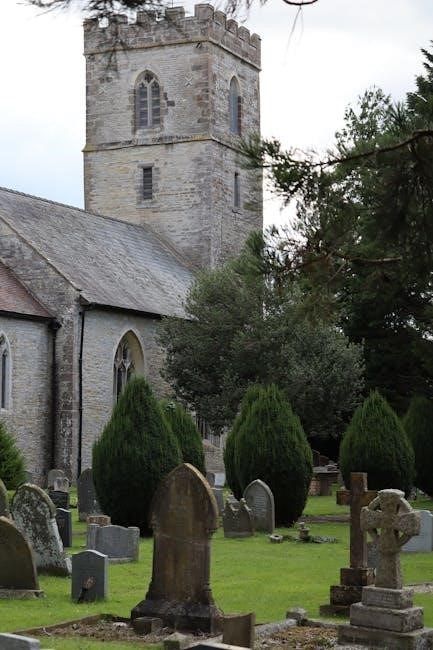
2․1 The Vigil for the Deceased
The vigil for the deceased is the first rite in the Order of Christian Funerals, typically held in a church or funeral home․ It serves as a time for prayer, reflection, and consolation for the grieving family and friends․ During the vigil, psalmody and readings from Scripture are often used to express grief and offer hope in the resurrection․ The rite emphasizes intercession for the deceased, seeking God’s mercy and forgiveness․ The vigil also includes a homily and intercessory prayers, providing comfort and strengthening the community’s faith․ This rite is a meaningful way to begin the funeral liturgies, offering both spiritual support and a celebration of the deceased’s life․
2․2 The Funeral Mass and Its Significance
The Funeral Mass is the central liturgical rite in the Order of Christian Funerals, celebrating the Eucharist as a sacrifice of praise and thanksgiving․ It is offered for the deceased, praying for their soul and the mercy of God․ The Mass emphasizes the Paschal mystery, where Christ’s death and resurrection bring hope to the grieving․ The congregation participates through prayers, hymns, and the Eucharist, uniting with the deceased in worship․ This rite underscores the Church’s belief in the transformative power of Christ’s sacrifice, offering consolation and assurance of eternal life․ The Funeral Mass is a profound expression of faith, providing comfort and hope to the bereaved while honoring the deceased․
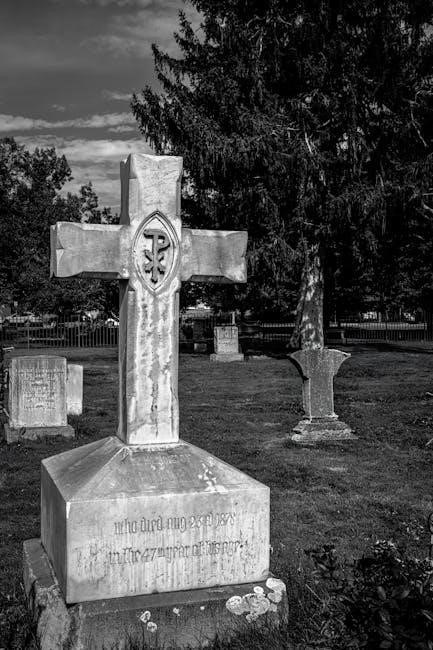
Theological Underpinnings of Christian Funerals
Christian funerals are rooted in the belief in Christ’s resurrection, emphasizing hope, prayer for the deceased, and the dignity of the human body as a temple of the Holy Spirit․
3․1 The Church’s Teachings on Death and the Afterlife
The Catholic Church teaches that death is not an end but a transition to eternal life with God․ Rooted in Scripture and Tradition, the Church affirms that Christ’s resurrection conquers death, offering hope of eternal life․ The human body, as a temple of the Holy Spirit, is treated with dignity, reflecting its future resurrection․ The Church believes in the reality of judgment, purgatory, heaven, and hell, emphasizing prayer for the deceased to aid their purification․ Funeral rites embody this theology, celebrating the deceased’s life while interceding for their soul․ This understanding underpins the OCF’s focus on consolation, hope, and intercession, affirming the Christian belief in life’s ultimate fulfillment in God․
3․2 The Role of Prayer and Intercession for the Deceased
Prayer and intercession for the deceased are central to Christian funeral rites, reflecting the belief in the Church’s communion with the saints․ Through prayers, the faithful seek to assist the deceased in their journey to eternal life, offering consolation and hope to the grieving․ The OCF emphasizes that the Church intercedes for the dead, praying for the forgiveness of their sins and their purification in purgatory․ The Eucharist, particularly the Funeral Mass, is a powerful expression of this intercession, uniting the living and the dead in Christ․ Such prayers affirm the Christian hope in the resurrection and eternal life, while also providing spiritual support to those mourning․ This practice underscores the Church’s commitment to caring for both the deceased and the bereaved․

Cultural and Pastoral Considerations
The Order of Christian Funerals acknowledges regional variations in funeral practices, emphasizing respect for cultural traditions while providing pastoral care to comfort the grieving and uphold dignity․

4․1 Regional Variations in Funeral Practices
Regional variations in funeral practices are acknowledged within the Order of Christian Funerals, allowing for cultural expressions while maintaining liturgical integrity․ Local traditions, such as specific hymns, readings, or symbols, may be incorporated to reflect the community’s heritage․ For instance, in some cultures, the vigil or wake includes unique rituals like the recitation of specific prayers or the use of traditional instruments․ These adaptations enrich the funeral rites, making them more meaningful and personal to the mourners․ The OCF encourages sensitivity to these customs, ensuring that the universal teachings of the Church are expressed through diverse cultural lenses, fostering unity in faith while respecting local identities and practices․
4․2 Ministering to the Bereaved
Ministering to the bereaved is a central aspect of the Order of Christian Funerals, emphasizing compassion, consolation, and spiritual support․ The Church offers a framework to help mourners navigate grief, providing rituals and prayers that foster hope and healing․ Through the funeral rites, the community gathers to express sorrow, celebrate the deceased’s life, and intercede for their soul․ The OCF encourages pastoral ministers to listen, comfort, and guide the bereaved, ensuring they feel supported in their faith journey․ This ministry extends beyond the liturgy, offering resources for ongoing care and reflection․ By balancing grief with hope in the resurrection, the Church helps the bereaved find solace in faith and community․
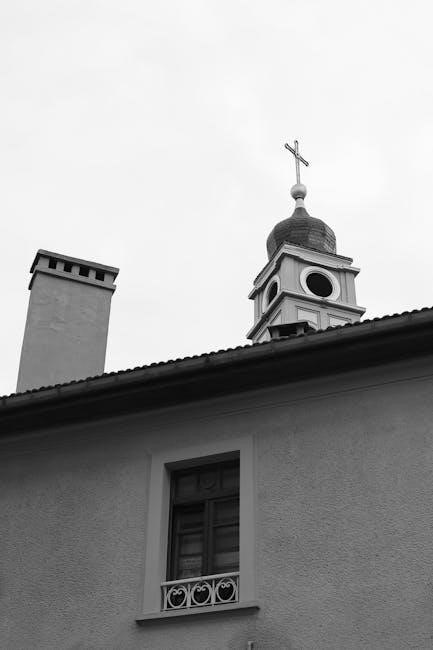
The Order of Christian Funerals profoundly reflects the Church’s reverence for human dignity and hope in eternal life, offering solace and spiritual guidance to the grieving․
5․1 The Importance of the Order of Christian Funerals in Modern Society
The Order of Christian Funerals holds profound significance in modern society by providing a structured, meaningful way to honor the deceased and console the grieving․ It emphasizes the dignity of human life, reflecting the Church’s teachings on death as a transition to eternal life․ The rites offer a sense of community and spiritual support, helping mourners navigate their loss with faith and hope․ By integrating prayer, scripture, and sacramental elements, the OCF fosters a deeper understanding of Christian beliefs about death and resurrection․ Its relevance endures as it adapts to cultural and pastoral needs, ensuring that funerals remain a source of comfort and renewal for all․
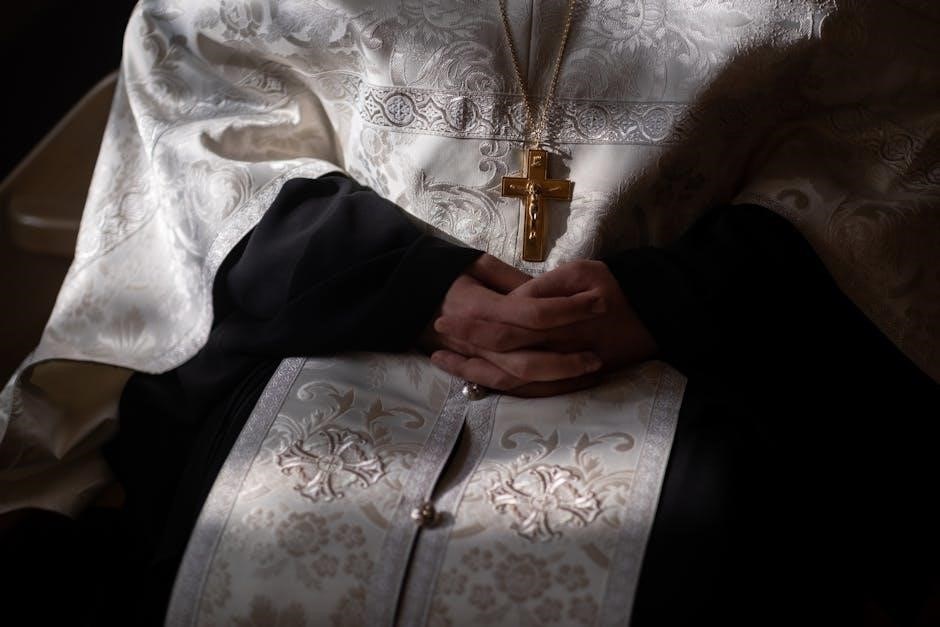
5․2 Final Reflections on the Dignity of the Human Body and Eternal Life
The Order of Christian Funerals profoundly reflects the Church’s reverence for the human body as a temple of the Holy Spirit, emphasizing its dignity even in death․ This respect is rooted in the Incarnation, where God became flesh, sanctifying human life․ The rites affirm the belief in eternal life, offering hope to the mourners and highlighting the deceased’s transition to a new life with God․ The Church’s teachings remind us that death is not an end but a passage to eternal glory․ By honoring the body and praying for the deceased, we uphold the sacredness of human existence and trust in the promise of resurrection and eternal life with Christ․

